Leaders of some of Cork’s faith communities share some Christmas reflections
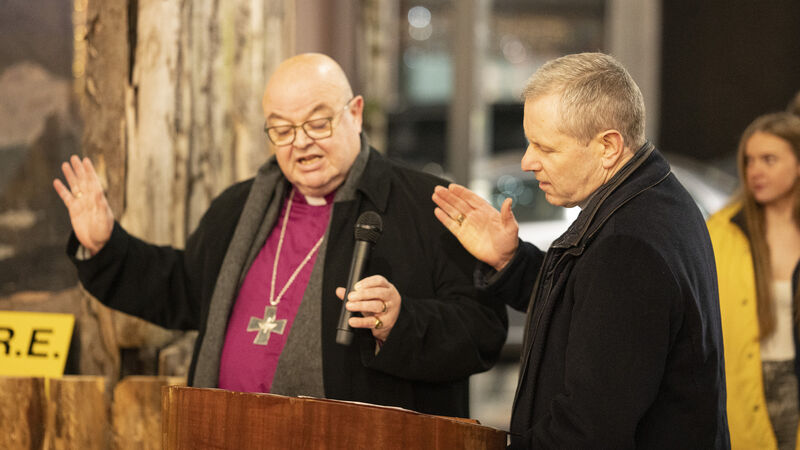
Bishop of Cork, Cloyne and Ross Right Reverend Paul Colton and Bishop of Cork and Ross Fintan Gavin Pictured at the launch of Cork’s iconic SHARE Crib. Photo: Gerard McCarthy photography
Christmas is a particular favourite time of year for the Church of Ireland, the Bishop of Cork, Cloyne, and Ross the Right Reverend Dr Paul Colton said.
“It will come as no surprise that the primary focus of Christmas, for me, is as a religious festival, one of the most important Christian festivals of the year, when we celebrate the coming of Jesus, the light of the world, the will of God, the incarnation of the word of God,” he said.
“For me, it’s primarily a Christian festival, and because of the work that I do, it’s a day when I lead worship and lead celebrations, and have done for the-last-more-than 40 years.
“We always have people in to join us on Christmas Day; that doesn’t really start until mid-afternoon,” he said.
“Up to then, the entire focus in our house is on leading the religious ceremony.”
The days that follow Christmas are more low-key, he said, with saints’ days, such as St Stephen’s Day, to be celebrated and with church services on those days, but with a pace that is less hectic.
The Church of Ireland has about 14,000 members in Cork city and county, Bishop Colton said.
“As far as churchgoing is concerned, it varies according to the time of year, but Christmas is a time when churchgoing is very strong, and that tradition is still very popular at this time,” he said.
“That’s not to say that we haven’t lost ground to make up, especially after Covid-19.”
He added that while there was “work to be done” regarding church attendance, “put it this way: I’m not pessimistic, I’m not discouraged.”
Asked his favourite part of Christmas, Bishop Colton said he particularly loves the religious services and the music.
“Seeing people who have been away and have come home, seeing the joy in their families, and, equally, of course, in the church community and the communities in general, we’re conscious of supporting people who find Christmas a difficult time, people who have had tragedy in their lives in the year since last Christmas,” he said.
Bishop Colton said “some of the horrible things that are going on in the world” can make people feel helpless.
“It’s worth remembering that the Christmas message is about light in darkness, and the darkness hasn’t put out the light, and that should give us courage and hope to press on.”
Hanukkah means ‘dedication’, and it commemorates the re-dedication of the Temple in Jerusalem following the victory by Jewish rebels, led by Judas Maccabeus, over the Syrian king Antiochus in 165BCE.
According to the Talmud, when the Maccabees set out to re-consecrate the temple, there was only enough consecrated olive oil to relight the candelabra for one day, but, miraculously, the oil remained lit for eight days.
Judaism follows the lunar calendar, so the date of Hanukkah varies between the end of November and the end of December every year, with the first day of the eight-day feast falling this year on Thursday, December 26, which, per Hebrew tradition, starts at sunset the day before, Christmas Day.
Each night of Hanukkah, the Chanukiah, or menorah, is lit.
It is an eight-branched candelabra and with a place for a ninth candle, the shammes, used to light the others.
One candle is lit on the first night of Hanukkah, and an additional candle on each successive night, until, on the eighth night, the Chanukiah is fully illuminated.
Cork has a Jewish tradition dating back to the mid-1700s, but the main wave of Jewish immigrants began to arrive here from what is now Lithuania in the 1880s.
At its peak, Cork city’s Jewish community was made up of 65 families, perhaps 450 people or so, mostly living in Hibernian Buildings, or Jewtown, as it is still known, but declining numbers led eventually to the closure of the South Terrace synagogue in 2016.
Nowadays, about 250 to 300 Jews live in Cork city and county, and the community has approximately 75 active members.
The lay leader of Cork’s Jewish community is Sophia Spiegel.
“The synagogue closed because Cork’s Orthodox community had become very, very small, but there is now a very vibrant Reform community in Cork, and we meet twice a month and we have services,” Ms Spiegel said.
Cork no longer has a synagogue, so the Jewish community uses another facility, and some of the remaining Orthodox Jews in Cork attend the Reform services.
Cork’s Jewish tradition is still remembered in Shalom Park, which neighbours Jewtown, and this year, as always, Hanukkah will be marked.
Because the ceremony falls this year on a bank holiday, Ms Spiegel said, the annual Hanukkah reception in City Hall will be deferred, but the lighting ceremony will go ahead as usual.
“The ceremony is on the evening of January 1,” Ms Spiegel said. “There are always eight lights burning in Shalom Park, but there is one lantern that only turns on for the last night of Hanukkah, and on that night a poem is read.”
In Islam, Jesus is revered as one of the greatest prophets, and the Quran teaches that he was born of a virgin, travelled with his disciples, and performed miracles, and was rejected by the Jewish establishment.
However, the Quran teaches that Jesus was not crucified, and did not die on the cross, and nor was he resurrected, but, rather, he was saved by God and miraculously ascended into heaven.
More than 5,000 Muslims live in Cork city and county.
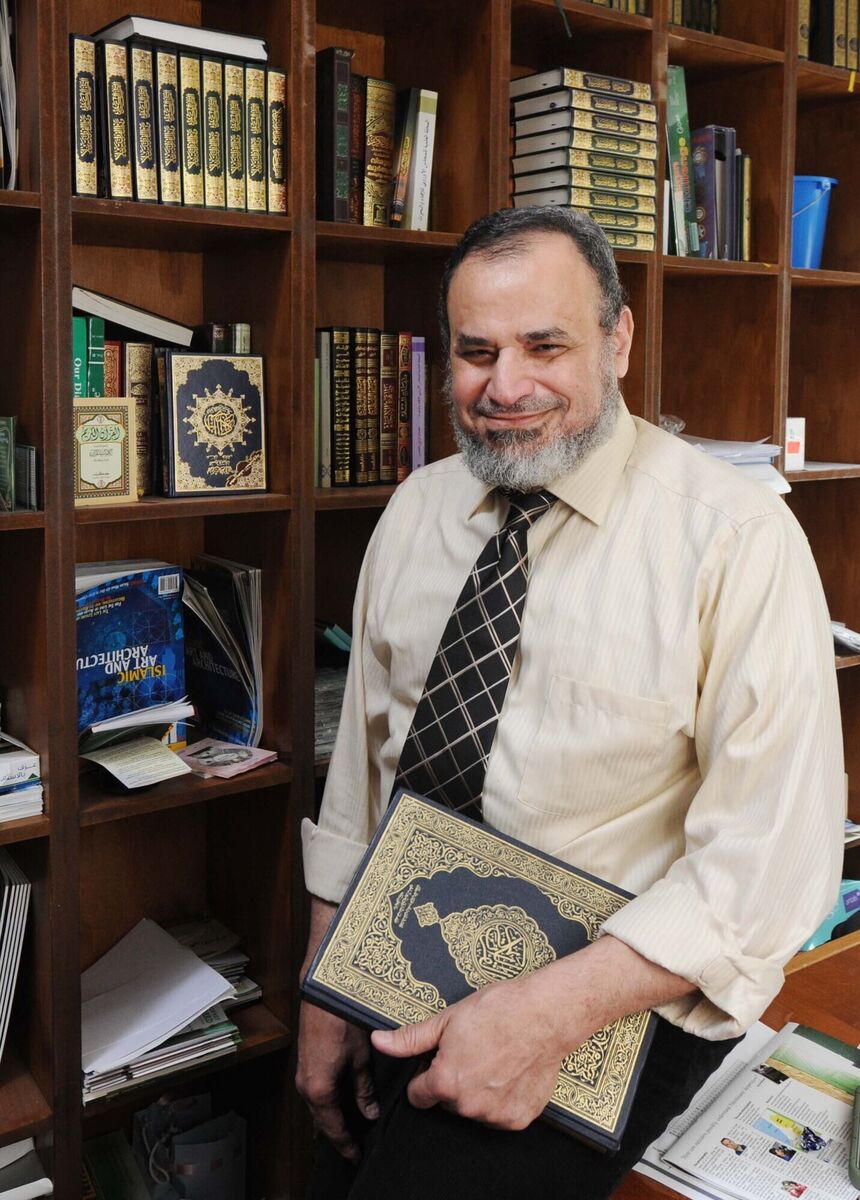
The Islamic Information Centre on Shandon St, which is run by Imam Dr Farghal Radwan, a retired consultant anaesthetist who has lived in Ireland for four decades, provides a place of worship and refection for Muslims from more than 40 countries.
Dr Radwan noted that the birth of Jesus is celebrated on several different dates by the various different Christian sects, with no consistency or certainty about the true date of his birth.
“If you look at the Orthodox Christian faith — in Egypt, in Greece, in Russia, in parts of Africa — they celebrate his birth at different times in January,” he said.
Muslims don’t specifically celebrate Christmas as the birth day of Jesus, but because he is one of Islam’s greatest prophets, they honour him every day, and try to live according to the teachings of the prophets.
Asked if Islam has an end-of-year festival comparable to Christmas, Dr Radwan said there were some parallels with the Muslim tradition of taking stock.
“At the end of the year, we look at what you have achieved over the year, because we believe that all your actions are calculated anew, so if you look at what’s good and what’s bad, to review your actions, at the end of the year everyone will have to look,” he said.
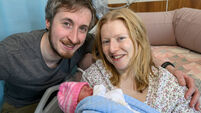
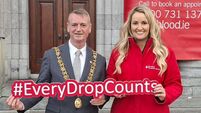


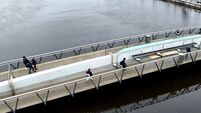
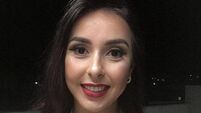




 App?
App?


